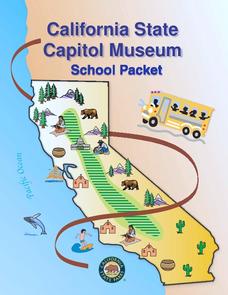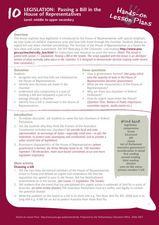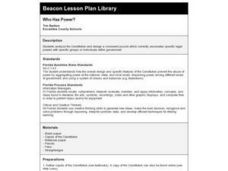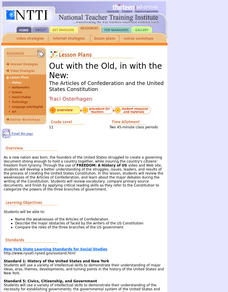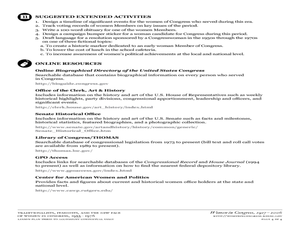Curated OER
American History Through the Len of the Supreme Court Decisions
Students examine the historical background of Supreme Court decisions and the basic principles behind legislation. As part of the lesson, students discover legal concepts and terms and write sentences using the vocabulary they have...
California State Parks
California State Capitol Museum School Packet
Here is great packet of worksheets to introduce your young learners to the general history of California and basic facts about the Golden State. Topics covered range from state counties, Sacramento, and the capitol to the...
Curated OER
The Supreme Court: The Judicial Power of the United States
Students investigate some basic facts about the Supreme Court by examining the United States Constitution and one of the landmark cases decided by that court. The operation of the Supreme Court forms the focus of the lesson.
Curated OER
Legislation: Passing a Bill in the House of Representatives
Students study the concept of legislation as it relates to passing a bill in the House of Representatives. In this legislation: passing a bill in the house of representative lesson plan, students identify why and how bills are introduced...
C-SPAN
How A Bill Becomes A Law
Seven steps are required for a bill to become a United States law. The Families First Coronavirus Response Act (H.R. 6201) is used as a model for the process of how a bill becomes a law. Class members work independently through a Google...
C-SPAN
14th Amendment Equal Protection Clause
Two Supreme Court cases, Plessy v. Ferguson and Brown v. Board of Education take center stage in a lesson about the Equal Protection Clause of the 14th Amendment. Class members research both cases to compare and contrast the rulings.
C-SPAN
Primary and Secondary Sources: Trailblazers in Congress
Trailblazers forge the path into uncharted territory, they establish a precedent for others to follow. Young historians research trailblazers in Congress using primary and secondary sources to profile outliers that changed the face of...
Judicial Learning Center
Your 1st Amendment Rights
Why should classes care about the First Amendment? An engaging lesson serves as a powerful tool for answering just that. As all four cases in the lesson relate directly to freedom of expression in schools, young scholars explore the...
Curated OER
Who Has Power?
Fourth graders discuss abuse of power in government and examine the Constitution for specific powers in each branch. They create a crossword puzzle utilizing terms and information regarding division of government powers and federalism
Curated OER
The Powers of Mom: Understanding the Legislative, Executive and Judicial Power
Tenth graders examine the powers of each branch of the government. They analyze the causes and effects of relationships within the government. They participate in activities to help them comprehend the material.
Curated OER
Issues Close to Home
Students discuss their role in their local government. Individually, they use various types of media to examine and take a position on a topic important to them. To introduce their position, they write a letter to the Board of...
Curated OER
Separation of Powers: Connecting the Separate Powers
Students study the concept of separation of powers. They recognize how the Constitution provides for separation of powers and categorize public officials into one of three branches of government. Students do a role play and see if...
Curated OER
U.S. Constitution - Checks and Balances
Students examine the separation of powers of the branches of the U.S. federal government. In this U.S. Constitution lesson, students listen to a SMART Board supported lecture on checks and balances of the Judicial, Legislative, and...
Curated OER
Out with the Old, in with the New
Eleventh graders review the weaknesses of the Articles of Confederation, and explore the major debates during the writing of the Constitution. They review vocabulary and compare primary source documents to study the three branches of...
Curated OER
Are We the People?
Students investigate their elected officials and their roles. For this governmental leadership lesson, students discuss the Constitution and research their elected officials. They also organize the information they find regarding the...
Curated OER
Checks and Balances in Supreme Court Nominations
Learners discover the system of Checks and Balances related to recent events prompting action by one or more of the three branches of government. They study the process for selecting and confirming a Supreme Court justice. They examine...
Curated OER
Essentials of the US Constitution
Learners determine how the content of the U.S. Government enables the U.S. Government to function. They examine the roles and functions of the three branches of government and how the separation of powers and checks and balances affect...
Curated OER
Cartoons for the Classroom: Defining the Separation of Power
In this current events worksheet, students analyze a political cartoon about the separation of powers in the American government and respond to 3 talking point questions.
Curated OER
President's Day
Young scholars access prior knowledge about the branches of government to explore foreign policy. In this conflict resolution lesson, students reflect on foreign policy decisions and participate in scenarios based on foreign policy events.
Curated OER
The Role of Individuals and Groups in the Census
Students learn why the census makes a difference. For this U.S. Census lesson plan, students describe and explain the roles that individuals, government agencies, and partner groups play in the census.
Curated OER
Constitution Lesson Plan
Third graders identify roles of Declaration of Independence and U.S. Constitution in establishing new country, create posters with their ideas about each part of Constitution, and explain three branches of government, including their...
Curated OER
A Changing of the Guard: Traditionalists, Feminists, and the New Face of Women in Congress
Students explore the role of women as Congressional leaders. In this women's rights lesson, students identify and investigate the impact of women representatives and senators in the U.S. Legislative Branch. Comprehension questions, data,...
Curated OER
What is an Iron Triangle?
Students discuss how interest groups, congress and the executive branch play a role in policy making to make up the Iron Triangle. They list the three points of the Iron Triangle and explain the role they have on public policy. Students...
Curated OER
Helping Right Whales - Right Now
In this whales worksheet, students answer eight questions referring to the right whales found in the Atlantic Ocean. Students read a map to answer three questions and five questions are multiple choice.
Other popular searches
- Three Branches of Government
- 3 Branches of Government
- Government 3 Branches
- The 3 Branches of Government
- 3 Branches of Governement
- Us Government 3 Branches
- Government 3 Branches Tn
- 3 Branches of Us Government
- Three Branches of Governement
- U.s. Government 3 Branches
- Three Branches of Governent
- Three Branches Government



